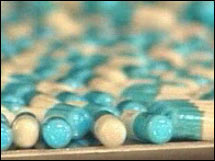|
Missing the $20 billion biogeneric boom Biotech drugs could lose patents in coming years, creating a biogeneric opportunity ... but there are barriers. NEW YORK (CNNMoney.com) -- A huge new industry - biogenerics - is waiting to be born. The problem is ... when will it be time and who will be the midwife?
The biotech industry is 30 years old and patent expirations are just a few years away. Normally generic competition would be maneuvering in, developing and testing substitutes in anticipation of the opened door. However, no regulatory system exists in the U.S. to approve generic versions of biotech drugs, effectively keeping the door shut. The Food and Drug Administration says it's difficult to make generic versions of biotech drugs because they're based on complex biological organisms, rather than simple molecular compounds like the more traditional pharmaceutical drugs. But advocates for biogeneric drugs claim that the agency is dragging its feet, and that manufacturers in other countries are already producing them. For instance Teva Pharmaceuticals (up $0.00 to $34.39, Charts), an Israeli company and the world's biggest maker of generic drugs, is already capable of producing biogenerics overseas, said Andrew Forman, analyst for WR Hambrecht. By 2010 some $20 billion worth of biogenerics will begin to become available, said Forman. He added that investors are being "incredibly myopic" if they can't recognize the potential for Teva's biogeneric market in the U.S. Another generic drug maker, Barr Laboratories (up $2.78 to $55.10, Charts), is trying to set itself up by attempting to buy Pliva, a Croatian company with the ability to manufacture biogenerics. Time and technology To understand the situation with biotech, look at the drug industry in general. Big Pharma companies are scrambling to make up for multi-billion dollar sales vacuums as key blockbusters - like the Merck cholesterol-cutter Zocor and the Pfizer antidepressant Zoloft - run out of patent protection. When this happens, generic drugmakers produce versions at severely reduced prices, and then revenue plunges. The biotech sector isn't at that point yet. Analysts say that big biotechs, like Amgen (up $0.43 to $66.12, Charts) and Genentech (up $0.23 to $79.54, Charts), are unlikely to feel the pinch of immediate generic pressure because the patent expirations on their biggest blockbusters are years away. (Caroline Pecquet, spokeswoman for Genentech, the oldest biotech in the industry, declined to say when the patents expire on the next Genentech products, because there are multiple patents for each drug.) Analysts believe that the first biotech blockbuster to face patent expiration will be Epogen, an anemia treatment for dialysis patients from Amgen, the world's biggest biotech. Epogen sales totaled $2.5 billion in 2005, making it Amgen's third-biggest seller. The patent is expected to run out in 2011. A new drug can take years to get approval from the FDA. So any company looking to make a biogeneric substitute for Epogen would have to start the process about now. But beyond the time factor, there are technical issues for biogenerics as well. "It's probably not as big a threat to biotech as the normal generic industry is to pharma, and the reason is that these generic biologics are unlikely to be substitutable for their [biotech] counterparts," said Philip Nadeau, analyst for Cowen & Co. Also, biotech drugs require intensive work from biogenerics companies in order to copy them. Unlike the generic pharmaceutical industry, biogeneric companies may have to run expensive and time-consuming clinical trials. "There's no way to 100 percent accurately reproduce the host that these compounds grow off of," said Casey Alexander, analyst for Gilford Securities. "Therefore it can never be functionally identical." The only way for a biogeneric company to produce an exact copy of a brand-name biotech drugs, said Alexander, is to "sneak into the factory and to steal the host, which is illegal." Semantics? But others say it's not impossible at all. According to Kathleen Jaeger, spokesman for the Generic Pharmaceutical Association, it's already happened with the FDA's approval in June of Omnitrope, a human growth hormone for children with growth problems from the Novartis (up $0.61 to $56.29, Charts)-owned generics maker Sandoz. This approval is recognized by some analysts as the first biogeneric, because the Sandoz-drug was based on the Pfizer biotech drug Genotropin. And based on that decision, Jaeger argued that the FDA should be capable of establishing a regulatory system for reviewing biogeneric drugs. But the FDA has denied that Omnitrope is a biogeneric, calling it a "follow-on protein product," and said that the drug was approved through a separate process that has nothing to do with biogenerics. Meanwhile, Rep. Henry Waxman of the 30th district of California, who helped establish the current regulatory system for generic drugs, is planning to introduce regulation on biogenerics this fall. "It does look as though the legislators are starting to look at this in a serious way," said Ken Cacciatore, analyst for SG Cowen & Co. "[But] it's still measured in years, not in months." The rest of the world isn't waiting for U.S. legislators and the FDA. Teva has bought plants in Mexico and Lithuania to make biogenerics, said Forman of WR Hambrecht, who said that biogeneric production could move into Western Europe, and then Canada, before U.S. companies get the chance to make the drugs here. |
|

